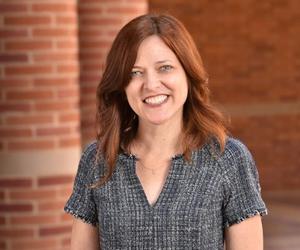 For Allison Hill, the president and CEO of Vroman's, Pasadena, Calif., who becomes CEO of the American Booksellers Association March 1, the move is from "one dream job to another dream job." And her new position, which she calls "an honor," is all the more striking because it is one that appealed to her long before it became open.
For Allison Hill, the president and CEO of Vroman's, Pasadena, Calif., who becomes CEO of the American Booksellers Association March 1, the move is from "one dream job to another dream job." And her new position, which she calls "an honor," is all the more striking because it is one that appealed to her long before it became open.
Hill and her husband usually celebrate New Year's Eve by going "off the grid and doing a reset," which includes a lot of reading, she says. A few years ago, her reading that holiday included Designing Your Life: How to Build a Well-Lived, Joyful Life (Knopf) by Stanford professors Bill Burnett and Dave Evans, which is based on a popular class they teach that applies the principles of product design to building a satisfying life. Her reading led Hill to imagine different career paths, and she came up with three options: eventually owning Vroman's; leaving the industry for "another values-based industry"; or becoming CEO of the ABA. "How amazing is that?!" she comments.
 |
|
| Allison Hill | |
The new position, which she calls "being able to do what I'm doing at Vroman's but on a larger scale, with many bookstores," fell into place in a variety of other ways: she had the realization about possibly becoming CEO of the ABA just before starting to work on her MBA, and she graduated this past June, soon after ABA CEO Oren Teicher announced his impending retirement. Various family matters made a move possible and attractive. "All was lining up," she says.
And, in a broader way, she says, the timing is right. "It's a fascinating time for booksellers and the industry." She cites two general challenges: competition, which will always be changing, and costs, which will keep going up. Booksellers need to stay ahead of that "curve of competition and cost" and "we need to do things to ensure that we have a sustainable business model and industry," she continues. (Many stores do innovative things in those areas, she stresses, and while bookselling is rewarding, it's not easy.) Current challenges include "online shopping at an unprecedented level"; Barnes & Noble's possible "resuscitation"; higher pay for staff (which she emphasizes is a good thing); a looming recession; and an election year. "We've had great leadership for many years, but it's always good to have fresh perspectives, see things with new eyes and reimagine the industry."
She notes that "like the exercises I do with the team" at Vroman's, she wants to talk about how to look at things differently. One key question: "What business are we in?" On paper, the answer seems simple, she continues, but customers can buy books in other types of stores and online. Bookstores offer something that customers value, and understanding that dynamic should help stores "shape new offers and initiatives and can be applied to the ABA and the industry as a whole."
Hill says that technology represents "a tremendous opportunity" for booksellers. It seems counterintuitive: so many customers like bricks-and-mortar bookstores because "they're old fashioned and because they can come into a store, talk to a person, touch a book." Still, "there's a whole new world of language and tech out there that we can't ignore. We have to speak that in some way or disconnect. It's a major challenge." She hopes booksellers can "look outside the industry, learn from other people, and bring that education and messaging back" to the book world.
She also suggests that the way bookstore success is measured should be expanded beyond the number of new stores to include such metrics as the percentage of stores that are profitable, the percentage paying a living wage, "the percentage of booksellers who can sleep at night because they don't feel at risk."
Hill calls it "an exciting time to talk with publishers," in part because, as "in a Venn diagram, our pain points overlap a bit." While the ABA has worked with publishers to create many helpful programs in recent years, more can be done to "grow the business" and make changes that "benefit both publishers and booksellers."
There is "no magic bullet" for the industry, she continues. "Some initiatives will be more successful than others." She points to Bookshop--the online site that aims to capture business that otherwise goes to Amazon--as "a good example of something that will shake up the industry in a good way." Such initiatives "create muscle memory for us to keep innovating."
While studying for her MBA at UCLA, Hill says, the most important lesson she learned was that "over and over you're faced with tasks you think are impossible but then you do them. I learned that anything put in front of me, I can do"--so much so that "I took a four-hour statistics exam!" That "muscle memory" has been invaluable.
For now, Hill is wrapping up her time at Vroman's, which includes (almost) completing the new wine bar; managing the holiday season; and finding and training her replacement. "I want to make it a clean transition," she says.
She is also making the long transition to the ABA. "There's so much in motion," she says. "I'm so lucky to have great partners in Joy and Dan [COO Joy Dallanegra-Sanger and senior strategy officer Dan Cullen]. We're meeting regularly and making decisions. It's a great way to acclimate, to observe, to listen, to see how things have been done in the past and see opportunities for change in the future."
She also praises the ABA's "amazing team. I'm struck by how passionate, committed and hardworking they are. I knew that from a distance, but working with them in the last couple months, I see how truly extraordinary they are." She notes that staff is already discussing "what works well, what might be stale, what they want to change."
She's eager to get to ABA headquarters in White Plains, N.Y., saying, "No matter what, it's different until I'm there and present every day." Noting that she lived in Boston for a decade and in Michigan for three years, Hill says that when she moves to the Northeast from Southern California, she hopes "living in snow and surviving winters all comes back!" --John Mutter

